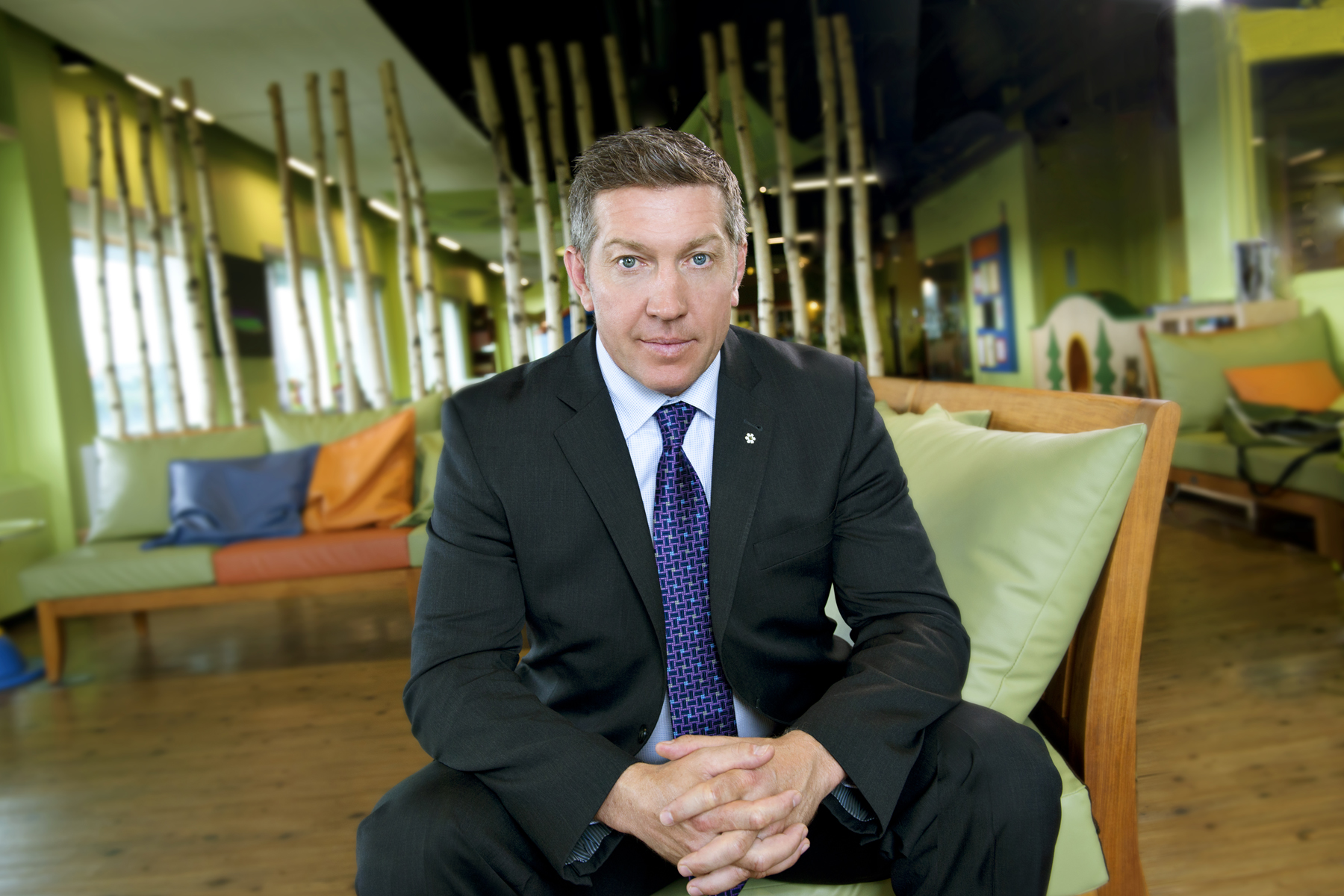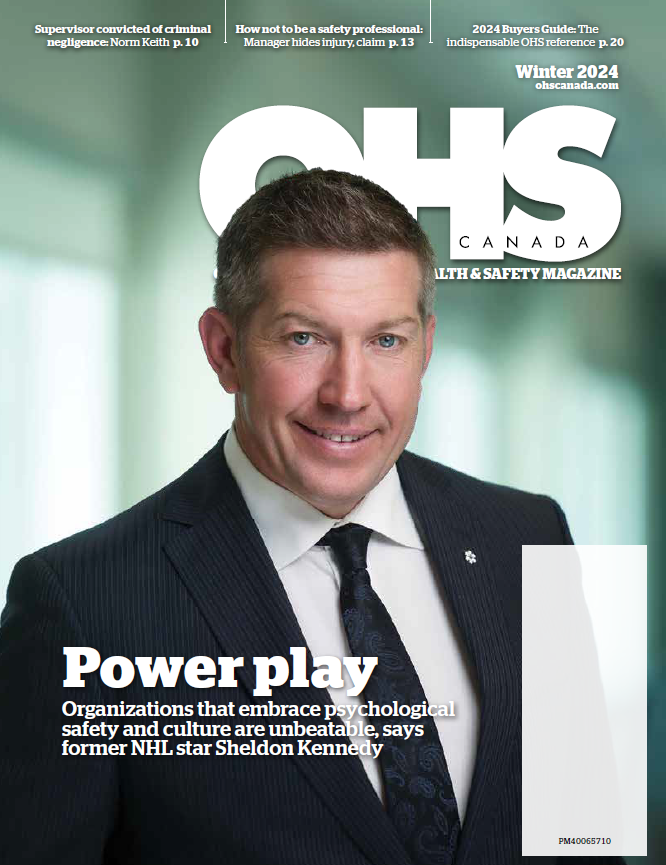
Skating towards change: Sheldon Kennedy’s mission to bodycheck workplace mental health
February 5, 2024
By
Todd Humber

Sheldon Kennedy. Photo: Respect Group/Headversity
“You betcha. What’s going on down in Ontario?”
Sheldon Kennedy’s voice crackles through his Bluetooth connection as he pilots his truck down the highway on the one-hour drive from Saskatoon to his farm. It’s his answer to the standard opening salvo in an interview: “Is now still a good time to chat?”
His early morning drive across the Canadian prairie is a million miles from Detroit’s old Joe Louis Arena, where he laced up his skates for the Red Wings for five years, including the 1992-93 season that saw him rack up 19 goals and 11 assists — his best offensive performance in the NHL.
But he’s not interested in reliving the glory days of donning the jerseys of the Red Wings, Calgary Flames or Boston Bruins. He has a new passion that can be summed up with one word: Respect. And he’s taking that message beyond the locker room and deep into corporate board rooms.
“Our workplace program really came from an extension of our sport program,” he said. In 2004, he teamed up with Wayne McNeil to create the Respect Group. One of its offerings is Respect in the Workplace, a 90-minute online interactive training program to prevent BAHD (bullying, abuse, harassment, and discrimination) behaviours.
“We started in sport to try and educate all coaches across this country on the issues of bullying, abuse, harassment, discrimination and neglect in all forms,” he said.
The message resonated with the volunteer coaches, who saw the value and started asking about bringing it to their workplaces, said Kennedy.

Photo: Getty Images
Locker rooms versus boardrooms
Kennedy sees a lot of parallels between locker rooms and workplaces, and he’s hard pressed to think of anything more important than mental health.
“Both of them need to be a psychologically safe space, or we’re never going to get the best out of the team,” he said. “When people don’t feel safe, whether they’re on a team or as an employee, they will never perform at their best. They need to feel welcomed and respected.”
There has been a lot of lip service paid to the fact that performance is 75 per cent mental, he said, but many organizations are failing to build supportive cultures — or not even trying.
“Right now, we build culture on a hope and a prayer,” said Kennedy. “We don’t have a strategic approach.”
To stamp out the BAHD cancers, organizations need to empower their workers — the 98 per cent of them that are good people — with the tools to build the confidence to step up and step in when issues arise, he said.
“When we have a strong, healthy and respectful culture, these issues don’t happen. And if they do happen, they’re dealt with right away,” he said, adding that in those scenarios the perpetrators won’t feel welcome.
Organizations need to move beyond having “posters, buttons, and policies,” he said.
“This is about leadership. Our role as leaders is to create a strong team,” said Kennedy. “What we know today is that psychological safety is the main factor behind why many young people choose which team they’re going to play on.”

Sheldon Kennedy on the cover of the winter 2024 issue of OHS Canada.
Practical advice
Kennedy has seen some common traits among people who have successfully built psychologically safe environments. It starts with leaders who can truly communicate with their teams on their level.
“You need to be able to walk the hallways, communicate and walk the walk,” he said. Too often, policies are pushed out without the true support of leaders and managers, and that is very transparent to employees.
“If the executives are not fully bought in, the team will never buy in,” said Kennedy.
His advice is to keep it simple, and break change down into achievable chunks. “What’s one thing we can do for the first half of this year? Walk that walk as a leader and talk to people and ask them how it’s going.”
Leadership is not about sitting in the corner office, he said. It’s connecting with teammates — often and genuinely.
“That’s huge. When they see it, and you start speaking about it, it resonates through the group,” he said. Coaches that have had the most success and have gained the most respect from players, from parents and those people around them, it’s those that communicate well, engage the team, ask questions, and learn from them.”
In the C-suite, there’s so much focus on revenue and profitability, he said, but not a lot of awareness around the massive impact culture can have on flow of red versus black ink.
“The ultimate goal of the company is to get better results on the numbers side, right? For the investors, or whoever that is, our best way to achieve that is to prioritize people’s well-being,” he said. “If numbers is our goal, we have to prioritize our culture.”
Chaos and trauma: ‘A very different hockey career’
Kennedy’s path on his ascent from minor hockey to the NHL isn’t the most pleasant to discuss. Fans of the game likely know his story. When asked who the best coach or leader he ever had as a player, he paused.
“Well, I had a very different hockey career than probably 90 per cent of people,” he said.
“It’s a very difficult question for me to answer. I’ve had some very strong managers in business, and I’ve had some very strong leaders in my world that have helped me find a way out of my own personal chaos and trauma from the abuse I suffered.”
He learned a lot from coaches about who he doesn’t want to be and had his eyes opened about just how much of an impact a bad leader can have on individuals, teams and organizations.
He was abused by his coach in junior hockey, a man who was honoured as Man of the Year by Hockey News magazine in 1989. That title was later revoked by the publication when the story came to light.
The ripple effect
Kennedy talked about the ripple effect of that behaviour which he discovered goes far beyond the actual victim.
“It’s not just the one being bullied that will leave or suffer,” he said. “It’s people that have witnessed that bullying happen in a workplace what are more apt to leave that company or that workplace.”
He made his own wellness and health his number one priority, and that has made a huge difference in his life.
“I learned how to become a good human being and how to treat myself well,” said Kennedy. “I think this is important. I can’t go out and tell people how to do it and how to be it if I can’t do it myself. If I’m not in a good position emotionally, physically, and spiritually, I can’t be leader I want to be.”
A leader who does that, and shows up every day for their teams, and makes 99.9 per cent of their decisions with culture in mind is going to be successful, he said.
Leadership is improving
Kennedy said there’s “no doubt” leadership styles have improved from the 1980s and 1990s.
“I told my story in 1996 and there was nothing in this space,” he said, adding he spent a lot of time just trying to convince people that these issues are real.
“Now, when you look at the leading companies in our country and around the world, the majority have already prioritized wellness and mental health and psychological safety in their workplaces,” he said. “That is one of their pillars of success. That’s huge.”
Over the last few decades, workplace culture has gone from being an esoteric concept to one that is embraced and understood.
“Culture, really, is about prioritizing and practicing and communication,” he said. “If we can have those things — and practice good, healthy communication to connect with someone else — that’s going to go a long way.”
A lasting legacy
The numbers are massive: The Respect Group has trained nearly 2.4 million Canadians to date, and that number is still growing.
One of the biggest learnings for participants is where the line is drawn when it comes to bullying and harassment. They’re asked, before the program, if they ever engaged in poor behaviour — and posed that question again at the end.
“The number who said they have doubles, coming out of self-admittance that people didn’t know where the line was drawn,” said Kennedy.
“We get people over the hump of being overridden with fear and anxiety when it comes to this type of training and this type of knowledge,” he said. “They’re engaging and embracing and, to me, when we get to that point is when we’re going to see change.”
Kennedy wants to ensure that what happened to him never happens to anyone else.
“I set out on a journey, and I didn’t realize how many people it has impacted. I thought I was the only one that his had ever happened to,” he said. “Most of the time, when people are in a horrible situation — whether it’s in the workplace or as a kid — they feel they’re alone. I realized quickly when I told my story that I wasn’t alone.”
It’s an unfortunate reality that people coming into the workforce likely have experienced some level of trauma in their lives.
“If we are not paying attention to that, that’s going to eliminate a lot of people from our work and our ability to find workers — because most people have had some kind of impact in their lives,” said Kennedy. “We shouldn’t have to try to convince people, at some point, that this is important. That’s my goal.”